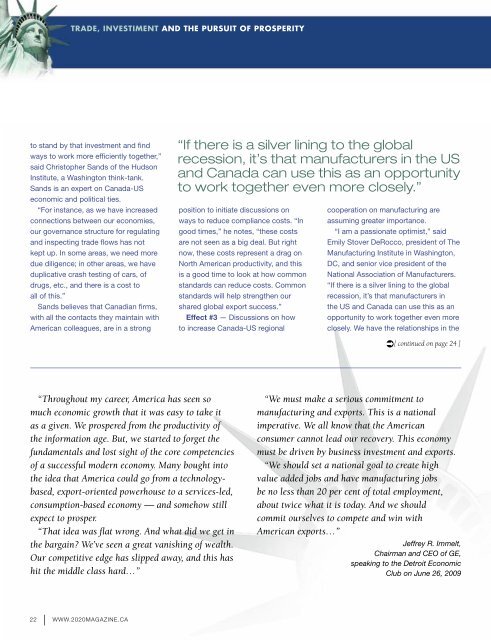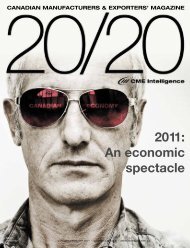The New - 20/20 Magazine
The New - 20/20 Magazine
The New - 20/20 Magazine
You also want an ePaper? Increase the reach of your titles
YUMPU automatically turns print PDFs into web optimized ePapers that Google loves.
TRADE, INVESTIMENT AND THE PURSUIT OF PROSPERITY<br />
to stand by that investment and find<br />
ways to work more efficiently together,”<br />
said christopher sands of the Hudson<br />
institute, a washington think-tank.<br />
sands is an expert on canada-us<br />
economic and political ties.<br />
“For instance, as we have increased<br />
connections between our economies,<br />
our governance structure for regulating<br />
and inspecting trade flows has not<br />
kept up. in some areas, we need more<br />
due diligence; in other areas, we have<br />
duplicative crash testing of cars, of<br />
drugs, etc., and there is a cost to<br />
all of this.”<br />
sands believes that canadian firms,<br />
with all the contacts they maintain with<br />
american colleagues, are in a strong<br />
“Throughout my career, America has seen so<br />
much economic growth that it was easy to take it<br />
as a given. We prospered from the productivity of<br />
the information age. But, we started to forget the<br />
fundamentals and lost sight of the core competencies<br />
of a successful modern economy. Many bought into<br />
the idea that America could go from a technologybased,<br />
export-oriented powerhouse to a services-led,<br />
consumption-based economy — and somehow still<br />
expect to prosper.<br />
“That idea was flat wrong. And what did we get in<br />
the bargain? We’ve seen a great vanishing of wealth.<br />
Our competitive edge has slipped away, and this has<br />
hit the middle class hard…”<br />
22 | www.<strong>20</strong><strong>20</strong>MAgAzINE.CA<br />
“If there is a silver lining to the global<br />
recession, it’s that manufacturers in the US<br />
and Canada can use this as an opportunity<br />
to work together even more closely.”<br />
position to initiate discussions on<br />
ways to reduce compliance costs. “in<br />
good times,” he notes, “these costs<br />
are not seen as a big deal. but right<br />
now, these costs represent a drag on<br />
north american productivity, and this<br />
is a good time to look at how common<br />
standards can reduce costs. common<br />
standards will help strengthen our<br />
shared global export success.”<br />
effect #3 — Discussions on how<br />
to increase canada-us regional<br />
cooperation on manufacturing are<br />
assuming greater importance.<br />
“i am a passionate optimist,” said<br />
emily stover Derocco, president of the<br />
manufacturing institute in washington,<br />
Dc, and senior vice president of the<br />
national association of manufacturers.<br />
“if there is a silver lining to the global<br />
recession, it’s that manufacturers in<br />
the us and canada can use this as an<br />
opportunity to work together even more<br />
closely. we have the relationships in the<br />
[ continued on page 24 ]<br />
“We must make a serious commitment to<br />
manufacturing and exports. This is a national<br />
imperative. We all know that the American<br />
consumer cannot lead our recovery. This economy<br />
must be driven by business investment and exports.<br />
“We should set a national goal to create high<br />
value added jobs and have manufacturing jobs<br />
be no less than <strong>20</strong> per cent of total employment,<br />
about twice what it is today. And we should<br />
commit ourselves to compete and win with<br />
American exports…”<br />
Jeffrey R. Immelt,<br />
Chairman and CEO of GE,<br />
speaking to the Detroit Economic<br />
Club on June 26, <strong>20</strong>09



